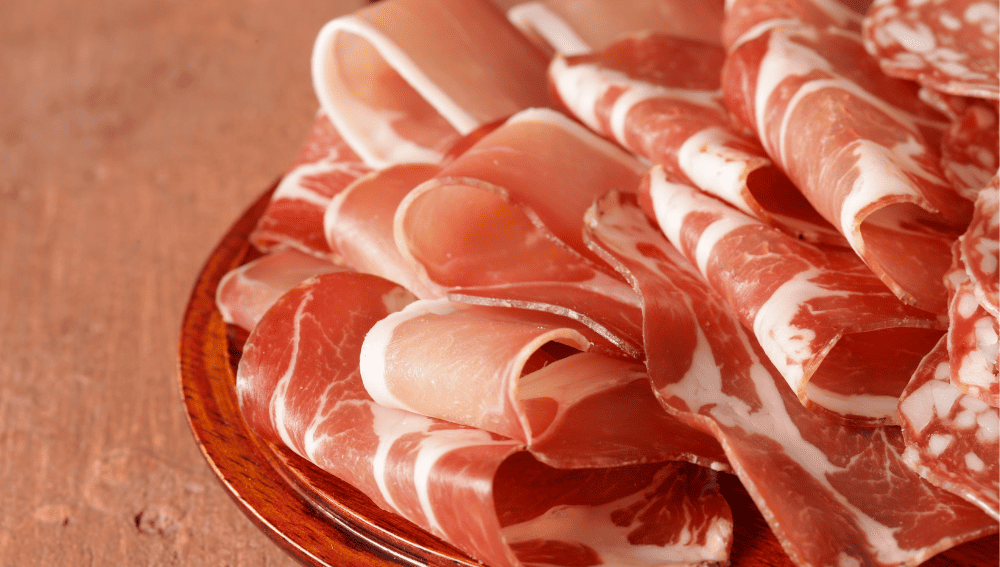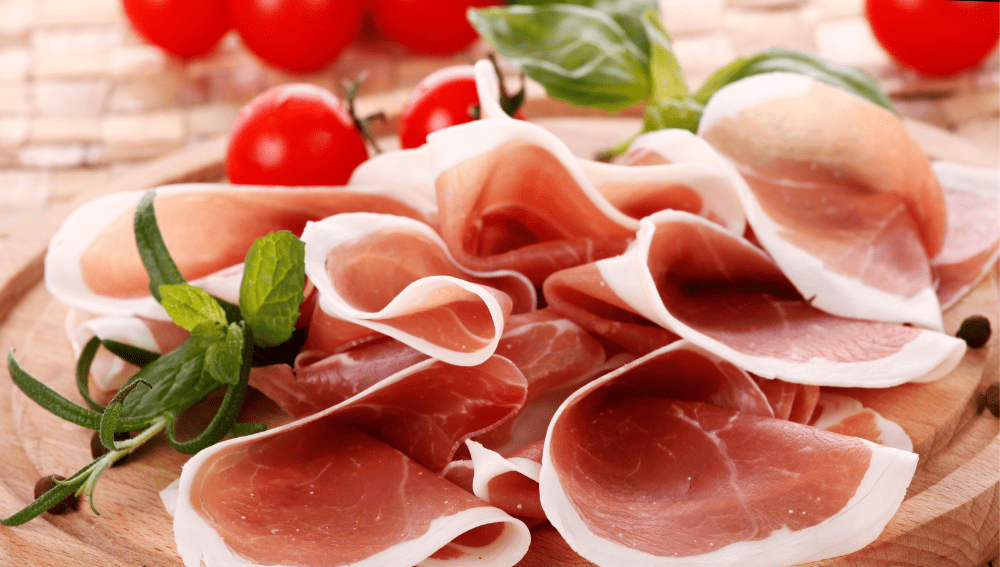Pregnancy is a time when women need to be careful about what they eat. Prosciutto is a type of Italian dry-cured ham that is often enjoyed as a delicacy. However, there is some debate about whether pregnant women should consume prosciutto.
Understanding Prosciutto Prosciutto is a type of ham that is made by curing the meat with salt and then air-drying it. It is a popular ingredient in Italian cuisine and is often served as an appetizer or used as a topping for pizza and pasta dishes.
Pregnancy and Food Safety During pregnancy, women need to be careful about what they eat to ensure the health and safety of their developing baby.
Some foods can be harmful to the baby, and pregnant women need to be aware of the potential risks associated with certain foods.
Key Takeaways
- Prosciutto is a type of Italian dry-cured ham that is often enjoyed as a delicacy.
- Pregnant women need to be careful about what they eat to ensure the health and safety of their developing baby.
- While prosciutto can be safe to eat during pregnancy, it is important to take certain precautions to reduce the risk of foodborne illness.
Related: Can you eat egg drop soup while pregnant
Understanding Prosciutto
Prosciutto is a type of cured meat that originates from Italy. It is typically made from the hind leg of a pig and is cured with salt, which removes moisture from the meat and helps to preserve it.
Cured meats, including prosciutto, are often fermented, which means that bacteria are added to the meat to break down the proteins and create a unique flavor. Prosciutto is also high in sodium and often contains nitrates, which are used as preservatives.
The fat content of prosciutto can vary depending on the cut and how it is prepared. Some prosciutto is trimmed of excess fat before it is sold, while others may have a higher fat content.
When purchasing prosciutto, it is important to read the label carefully to understand the ingredients and nutritional information. Some prosciutto may contain added sugars or other ingredients that may not be suitable for pregnant women.
Overall, while prosciutto can be a delicious addition to many dishes, pregnant women should be cautious about consuming it due to the high sodium and nitrate content.
It is always best to consult with a healthcare provider to determine what foods are safe and appropriate during pregnancy.
Pregnancy and Food Safety
During pregnancy, it is important to pay close attention to food safety to ensure the health and safety of both the mother and the developing baby.
Pregnant women are more susceptible to foodborne illnesses, which can have serious consequences for both the mother and the baby. Therefore, it is important to take necessary precautions when it comes to food safety.
Pregnant women should avoid certain foods that are more likely to be contaminated with harmful bacteria or parasites, such as raw or undercooked meat, poultry, seafood, and eggs.
They should also avoid unpasteurized dairy products and juices, as well as raw sprouts. It is also important to wash all fruits and vegetables thoroughly before eating them.
In addition to avoiding certain foods, pregnant women should also focus on consuming a healthy and balanced diet.
This includes eating plenty of fresh fruits and vegetables, low-fat dairy products, and lean protein sources. It is also important to stay hydrated by drinking plenty of water throughout the day.
It is recommended that pregnant women consult with their doctor or a registered dietitian to develop a healthy and balanced diet plan that meets their individual needs.
They can also provide guidance on appropriate weight gain during pregnancy and offer advice on any necessary supplements.
Overall, by following basic food safety guidelines and focusing on a healthy and balanced diet, pregnant women can help ensure the health and development of their growing baby.
Related: Can I eat clam chowder while pregnant
Potential Risks of Prosciutto in Pregnancy
Prosciutto is a dry-cured ham that originates from Italy and is made from the hind leg of a pig. It is a popular delicacy in many parts of the world and is often served as part of a charcuterie board or used as a topping for pizza or pasta dishes.
However, when it comes to pregnancy, there are potential risks associated with consuming prosciutto.
One of the main concerns with prosciutto is the risk of listeria contamination. Listeria is a type of bacteria that can cause a serious infection called listeriosis.
Pregnant women are at a higher risk of contracting listeriosis, and the infection can lead to miscarriage, stillbirth, or neonatal death. Prosciutto has been linked to listeria outbreaks in the past, and it is important for pregnant women to take precautions to avoid this type of contamination.
In addition to listeria, prosciutto can also be contaminated with other harmful bacteria such as E. coli and salmonella. These bacteria can cause food poisoning, which can lead to fever, vomiting, and diarrhea. In severe cases, food poisoning can also cause premature labor or birth defects.
Another potential risk of prosciutto is the presence of a parasite called Toxoplasma gondii. This parasite can cause a condition called toxoplasmosis, which can lead to serious health problems in the fetus.
Pregnant women who contract toxoplasmosis may experience flu-like symptoms, but the infection can also be asymptomatic.
To reduce the risk of these potential complications, pregnant women should avoid consuming prosciutto and other types of deli meats unless they have been cooked to an internal temperature of 165°F.
They should also practice good food safety habits such as washing hands and surfaces that come into contact with raw meat, avoiding cross-contamination, and refrigerating perishable foods promptly.
Overall, while prosciutto can be a tasty addition to many dishes, pregnant women should exercise caution and avoid consuming it to reduce the risk of potential complications.
Safe Consumption of Prosciutto
Prosciutto is a type of dry-cured ham that is popular in many cuisines around the world. However, pregnant women may be concerned about whether it is safe to consume prosciutto during pregnancy.
According to the USDA Food Safety and Inspection Service, pregnant women can safely consume prosciutto if it is cooked to an internal temperature of 160 degrees Fahrenheit. This means that cooked prosciutto, prosciutto cotto, or well-cooked bacon is safe to consume during pregnancy.
It is important to note that consuming prosciutto that is not cooked to a safe temperature can increase the risk of foodborne illness. Pregnant women should avoid consuming prosciutto that is not cooked or heated thoroughly.
One way to ensure that prosciutto is safe to consume is to cook it until it is steaming hot. This can be done by heating it in the microwave or cooking it on the stove at high heat. Using a food thermometer can also help ensure that prosciutto is cooked to a safe temperature.
Crispy prosciutto may be a popular ingredient in some dishes, but it is important to ensure that it is fully cooked before consuming it during pregnancy.
Pregnant women should also avoid consuming prosciutto that is past its expiration date or has been stored improperly.
In summary, pregnant women can safely consume cooked prosciutto, prosciutto cotto, or well-cooked bacon that has been heated to an internal temperature of 160 degrees Fahrenheit.
It is important to ensure that prosciutto is cooked thoroughly and stored properly to reduce the risk of foodborne illness.
Related: Can you watch scary movies while pregnant?
Prosciutto in Meals
Prosciutto is a type of ham that is typically served raw, salt-cured, and thinly sliced. It is a popular ingredient in many Italian dishes, including salads, appetizers, and pizza. However, pregnant women may be concerned about the safety of consuming prosciutto during pregnancy.
Deli meats, including prosciutto, can potentially carry harmful bacteria that can cause food-borne illness.
Pregnant women are at a higher risk of developing complications from food-borne illness, which is why it is important to take precautions when consuming these types of foods.
When it comes to prosciutto, it is generally recommended that pregnant women avoid consuming raw or undercooked prosciutto. However, prosciutto that has been cooked to a safe temperature is considered safe for consumption.
It is also important to note that prosciutto should be consumed in moderation, as it is high in salt and fat. Pregnant women should aim to consume a balanced diet that includes a variety of protein sources, such as lean meats, poultry, fish, and plant-based sources.
When incorporating prosciutto into meals, pregnant women should also be mindful of the other ingredients that are being used. For example, salads that contain raw vegetables or unpasteurized cheese should be avoided.
Prosciutto on pizza or in kebabs should be cooked to a safe temperature, and sushi rolls that contain smoked or cooked prosciutto are generally considered safe.
Overall, pregnant women can safely consume prosciutto as long as it is cooked to a safe temperature and consumed in moderation. By following these guidelines, pregnant women can enjoy the delicious flavors of prosciutto without compromising their health or the health of their baby.
Symptoms of Foodborne Illness
Foodborne illness can cause a range of symptoms that can vary depending on the type of bacteria or virus present in the contaminated food. Some of the common symptoms of foodborne illness include nausea, vomiting, diarrhea, stomach cramps, muscle aches, fever, and fatigue.
In some cases, foodborne illness can also cause more severe symptoms such as convulsions, headaches, and nervous system problems. These symptoms are more commonly associated with bacterial infections such as Listeria or Salmonella.
If a pregnant woman experiences any of these symptoms after consuming prosciutto or any other type of contaminated food, it is important to seek medical attention immediately.
In some cases, foodborne illness can lead to more serious complications such as dehydration, premature labor, or even miscarriage.
It is also important to note that pregnant women are at a higher risk of developing severe symptoms from foodborne illness due to changes in their immune system during pregnancy.
Therefore, it is crucial for pregnant women to take extra precautions when it comes to food safety.
In summary, pregnant women should be aware of the symptoms of foodborne illness and seek medical attention if they experience any of these symptoms after consuming prosciutto or any other type of contaminated food.
Taking precautions to ensure food safety can help prevent the risk of foodborne illness during pregnancy.
Safety Precautions in Restaurants
When dining out during pregnancy, it is essential to take certain precautions to ensure the safety of both the mother and the unborn baby.
Here are some safety measures to take when eating out in restaurants:
- Choose reputable restaurants: It is essential to choose a restaurant that is known for its cleanliness and hygiene. Restaurants with a good reputation are more likely to follow food safety regulations and take precautions to prevent cross-contamination.
- Avoid undercooked meats: Pregnant women should avoid consuming undercooked or raw meats, such as rare steak or sushi. Undercooked meats can contain harmful bacteria such as E. coli or Salmonella, which can cause food poisoning and harm the developing fetus.
- Be cautious with snacks: Snacks such as raw vegetables, unpasteurized cheeses, and deli meats can also pose a risk of bacterial contamination. Make sure to thoroughly wash raw vegetables and avoid deli meats unless they are heated until steaming.
- Beware of chemicals: Pregnant women should also be cautious of chemicals commonly used in restaurants, such as cleaning products and pesticides. If possible, choose restaurants that use natural cleaning products and avoid sitting near areas where pesticides are being used.
- Be mindful of dairy products: Soft cheeses like feta, brie, and camembert, as well as unpasteurized milk, can also pose a risk of bacterial contamination. Make sure to choose pasteurized dairy products to reduce the risk of infection.
- Consider prosciutto crudo: When it comes to prosciutto, it is important to choose the right type. Prosciutto crudo, or raw prosciutto, should be avoided during pregnancy due to the risk of bacterial contamination. However, cooked prosciutto is safe to eat.
- Keep newborns in mind: It is also important to keep in mind that newborns are particularly vulnerable to foodborne illnesses. Pregnant women should take extra precautions when dining out, as they can pass on harmful bacteria to their newborn through breast milk.
By taking these safety precautions, pregnant women can enjoy dining out without putting themselves or their unborn baby at risk.
Conclusion
In conclusion, the question of whether pregnant women can eat prosciutto is a complex one.
While some sources, such as the CDC, recommend avoiding all deli meats during pregnancy due to the risk of listeria, others, such as the FDA, state that it is safe to consume these meats if they have been heated to a certain temperature.
It is important for pregnant women to be aware of the risk of listeria, which can cause serious complications for both the mother and the baby. However, it is also important to note that the risk of contracting listeria from prosciutto is relatively low.
For pregnant women with high blood pressure, it is recommended to limit their sodium intake, which may be a concern when consuming prosciutto due to its high salt content.
It is important for pregnant women to discuss their dietary choices with their healthcare provider to ensure that they are meeting their nutritional needs while also minimizing any potential risks.
Overall, the decision to consume prosciutto during pregnancy is a personal one that should be made in consultation with a healthcare provider.
Pregnant women should be aware of the potential risks and take steps to minimize them, such as heating deli meats to the recommended temperature and limiting their sodium intake.
Related: Can you eat crawfish while pregnant?
Frequently Asked Questions
Is it safe for pregnant women to consume cured meats?
Cured meats have a higher risk of containing bacteria that can be harmful to pregnant women and their unborn babies. Pregnant women are advised to avoid consuming cured meats, especially if they are not cooked or heated properly.
Which types of deli meats are safe for pregnant women to eat?
Cooked deli meats, such as ham, turkey, chicken, and roast beef, are generally considered safe for pregnant women to eat. However, it is important to make sure that the meat is cooked to an internal temperature of 165°F to kill any harmful bacteria.
Can pregnant women eat prosciutto cotto?
Prosciutto cotto, or cooked prosciutto, is a safer option for pregnant women compared to raw prosciutto. However, it is still recommended to heat the prosciutto before consuming it to reduce the risk of bacterial contamination.
What are the risks of consuming prosciutto during pregnancy?
Raw prosciutto and other cured meats have a higher risk of containing Listeria monocytogenes, a type of bacteria that can cause serious illness in pregnant women and their unborn babies.
Listeriosis can lead to miscarriage, stillbirth, premature delivery, or life-threatening infections in newborns.
Are there any alternatives to prosciutto for pregnant women?
Pregnant women can opt for other cooked meats, such as chicken, turkey, or roast beef, as a safe alternative to prosciutto. They can also consider vegetarian options, such as grilled vegetables or tofu.
Can microwaving prosciutto make it safe for pregnant women to eat?
Microwaving prosciutto may not be enough to kill all the harmful bacteria present in the meat. It is recommended to cook the prosciutto to an internal temperature of 165°F to ensure that it is safe for pregnant women to consume.
Learn more about: When To Start Buying Baby Stuff During Pregnancy?

Iesha is a loving mother of 2 beautiful children. She’s an active parent who enjoys indoor and outdoor adventures with her family. Her mission is to share practical and realistic parenting advice to help the parenting community becoming stronger.




